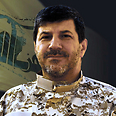
Hassan al-Laqqis
צילום: AFP PHOTO /HO/HEZBOLLAH
Dead Hezbollah commander's offspring praise operative's legacy
Lebanese media interviews children, grandchildren who want to follow in assassinated al-Laqqis' path. His will commanded: Continue Jihad
In the wake of senior Hezbollah commander Hassan al-Laqqis' assassination, the Shiite organization has concentrated its efforts on showing how his legacy permeated the lives of his family members and acquaintances.
Al-Manar, the Lebanese television channel affiliated with Hezbollah, carried interviews with his daughters and grandson, who shared stories of his personal life and his importance to the terrorist oganization.
Related stories:
- Iran: Israel behind 'cowardly murder' of Hezbollah operative
- Hezbollah says commander killed in Beirut, blames Israel
- Report: 250 Hezbollah fighters killed near Damascus
"I love him very much and want to be just like him – a computer engineer," said the grandson.
Report on family of al-Laqqis (Al-Manar)
Sitting by a picture of the late Hezbollah commander, his granddaughter said, "My father taught us many things about the Islamic resistance, and told us about the great (Hezbollah chief Hassan) Nasrallah. He was generous and compassionate and handsome like a star in the sky.
"The moment he opened the door, the atmosphere changed in the house. There were laughs, jokes, and games," she emphasized.
Al-Laqqis' daughter, who was interviewed on Lebanon's Al-Mayadeen channel, read a document by her father titled: "My will to my commander, the great Hassan Nasrallah." According to the document, parts of which were read by al-Laqqis' grave, the deceased commanded "to continue Jihad in the way of Hezbollah, the way of pride and honor, and to assist its leader."
Hezbollah Hit
The eldest daughter, Fatima, said that she discovered the nature of her father's work only after she read an article in the Israeli press, noting her fathre's importance to the organization was described: "It was written that my father is in charge of developing Hezbollah's artillery capability and the organization's communications."She added, "Thanks to him the resistance has achieved this level of armament and became the strongest military force in the Middle East." According to her, al-Laqqis considered these claims exaggerations, but she "believes there is no exaggeration."
Al-Laqqis, head of Hezbollah's technology and communications unit that played a central role in the rehabilitation of the organization's communications system after the Second Lebanon War, was assassinated in his car in the parking lot of his Beirut residence.
"He was a jihadist," announced Nasrallah's organization as it cast the blame on Israel: "The direct accusation is naturally aimed at the Israeli enemy, which has attempted to assassinate our shahid several times. This enemy must assume responsibility and the consequences for this heinous crime."
After the release of the Hezbollah statement, official Iranian sources added their voice to the accusations, as did Hezbollah's executive council deputy, Sheikh Nabil Qaouk. Over the weekend Qaouk said, "The assassination is a crime against the homeland and a breach of its sovereignty. Israel fears a direct confrontation with Hezbollah, and that is why it performed this cowardly act in the middle of the night."
The assassination – a harsh hit on the organization – occurred during a period of time in which the Shiite movement is deeply embroiled in the Syrian civil war, alongside President Bashar Assad; last week Arab media reported that the operations commander of Hezbollah, Ali Shabib, was killed in battle with rebels in the suburbs of Damascus.
In February 2008, Imad Mornia, a Hezbollah operations officer, was killed in a mysterious explosion. Mornia was considered the "brain" behind the terrorist attacks in Buenos Aires and 1983 bombing of the US Marines barracks in Beirut.
Mornia was involved in the kidnapping of IDF soldiers, and his assassination also brought forth accusations by Hezbollah against Israel.
- Receive Ynetnews updates directly to your desktop










